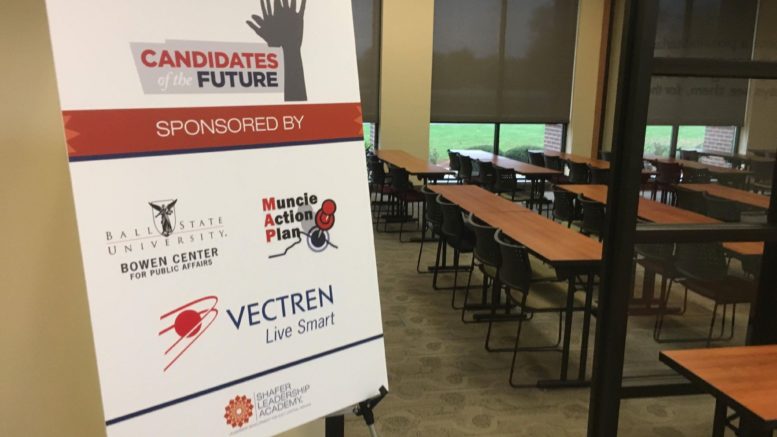By: Aimee Robertson-Fant, Neighborhood Organizer, Muncie Action Plan—
Muncie, IN—In the face of national political discord and global unrest, citizens could choose to be powerless spectators, sitting on the sidelines, but such is not the case the community of Muncie. Perhaps the silver lining and real power is found in citizens’ willingness to identify the outcomes they can influence in their own neighborhoods and communities by finding their local voice and focusing on what they can do to be agent of positive change in their own circles, today and tomorrow.
50 active citizens and counting have recently registered for: “Candidates of the Future”—a collaboration between Ball State University’s Bowen Center for Public Affairs, Shafer Leadership Academy, Building Better Neighborhoods/Muncie Action Plan which is an inaugural, grassroots, deeply-inclusive and first-of-its kind-to-the-community workshop, rooted in the belief that everyday citizens can lead and run for local office. The six-hour workshop is for anyone, regardless of political experience, who has an interest in running for local office and wants to learn more about the campaign process. Registrants will hear from state officials representing each of three “ballot access” parties, learn about key community organizations who are tackling Delaware County’s most pressing issues, plug into community plans (Vision 2021, Muncie-Delaware County Economic Alliance and Muncie Action Plan) and explore what to expect when serving in office.
Candidates of the Future is set for Saturday November 11th, 9am-3pm at the Innovation Connector, will be facilitated by the Bowen Center for Public Affairs at Ball State University and was coordinated by a steering committee including: Chip Taylor, (Bowen Center), Mitch Isaacs, (Shafer Leadership Academy) Heather Williams, (Building Better Neighborhoods) and Aimee Fant, (Muncie Action Plan). The combined efforts of each of these organizations align with a common mission: to build and cultivate neighborhood and community leadership at the grassroots level.
Initially, the steering committee estimated a class size of 35 registrants, and within 24 hours of release, each spot was taken so the committee voted to increase class capacity to 50; the remaining seats were then filled within a few days. With a steadily growing waiting list, the work has already begun to secure resources for next year’s Candidates of the Future, to meet the demand for those who could not be accommodated this year.
“When we don’t know how to participate in local democracy, it’s easy to succumb to a level of public indifference. It starts with the small decisions –like the height of buildings or the types of activities that are planned for a local park. This public indifference then starts to influence the bigger decisions – especially how our local taxes are spent.” —Projects for Public Spaces
For more information please visit: http://www.shaferleadership.com/candidates-of-the-future



